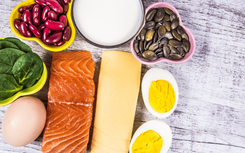
Getting Enough Calcium on a Vegan Diet
Calcium is an important mineral for our bodies. It helps to keep our bones and teeth healthy and strong, facilitates effective blood clotting, helps muscles contract and relax, helps regulate heart function and is essential for a healthy immune system.
Most of the calcium we need comes from the foods we eat. However, as some of the most calcium-rich foods are animal-based like dairy products, people following a vegan diet may be worried about whether they are getting enough calcium.
In this article, we examine calcium and how to ensure adequate intake when following a vegan diet.
What is calcium?
Calcium is a mineral that plays an important role in multiple bodily functions, including:
- Helping build healthy bones and teeth
- Regulating muscle contractions, including your heartbeat
- Ensuring your blood clots normally
- Helping regulate the heart
- Helps ensure your immune system stays healthy
How much calcium do I need a day?
The exact amount of calcium you need depends on your unique needs, but the below table offers a general guide based on your age and life stage:
| Age | Calcium |
|---|---|
| 19+ years | 700mg a day |
| Breastfeeding | 1250mg a day |
| Adult women after menopause | 1200mg a day |
A significant lack of calcium in children can lead to a condition called rickets. Rickets affect bone development and can cause bone pain, poor growth, and soft, weak bones that become deformed. Adults can experience a similar condition known as osteomalacia or soft bones.
For most people, the risk of getting too little calcium shows up later in life with a condition known as osteoporosis. This condition weakens bones, making them more fragile and likely to break.
Why do vegans struggle to get enough calcium?
Some research suggests that vegans have a lower calcium intake than non-vegans and that many vegans have lower bone mineral density. So, it is important for vegans to consider their calcium intake.
Generally, most people can get all the calcium they need from food simply by following a healthy, balanced diet. However, people who follow a restricted diet, like vegans, may find it harder to ensure that they are getting enough calcium. That's because some of the most readily available calcium-rich food sources are dairy products like milk, yoghurt, and cheese.
Although plenty of vegetables and fruit contain excellent levels of calcium, it can be harder for our bodies to absorb all the calcium they contain. They also contain natural components that reduce our body's ability to access calcium.
As a result, people following a vegan diet may struggle to get all the calcium they need. However, it is possible to follow a vegan diet and get enough calcium from your diet if you eat a varied mix of food, including green leafy vegetables, nuts, and seeds, as well as products fortified with calcium.
How do vegans get calcium?
The best way for vegans to get all the calcium they need is to eat a varied diet rich in leafy greens, beans, lentils, soya, nuts, and seeds, as well as products fortified with calcium. It is also possible to take a calcium supplement to boost your levels.
Do vegans need calcium supplements?
Not all vegans need to take a calcium supplement. However, if you follow a vegan diet, and don’t enjoy a very varied diet, it may be best to consider getting your calcium levels checked to see if taking a calcium supplement is needed.
Best vegan food sources of calcium
If you are keen to try and increase your calcium levels through diet, the below foods are some of the best vegan food sources of calcium:
Plant-based milk alternatives fortified with calcium and vitamin D
Many plant-based milk alternatives are fortified with calcium and vitamin D (which can help improve your absorption of calcium). Try plant-based milk alternatives such as:
- Unsweetened almond milk
- Soya milk
- Oat milk
- Coconut milk
Check the label of your chosen plant-based alternative milk to make sure you are choosing a fortified plant-based milk.
Plant-based yoghurt alternatives
Just like plant-based milks, many plant-based yoghurt alternatives are fortified with calcium. Generally, a 125g portion of a plant-based yoghurt alternative, fortified with calcium and vitamin D, provides around 150 mg of calcium, but be sure to check the label.
Green leafy vegetables
Green leafy vegetables are generally the highest plant-based sources of calcium. However, it is important to remember that the calcium in these vegetables is often less bioavailable, meaning your body may be unable to access all the calcium the vegetable contains.
Some vegetables that are good sources of calcium include:
- Spinach
- Kale
- Turnip greens/tops
- Purple sprouting broccoli
- Spring greens
- Broccoli
- Brussels sprouts
Fresh fruit
Fruit can be a good source of calcium in your diet, but it's important to note that, like green leafy vegetables, your body may not absorb all of the calcium.
Some fruits that are decent sources of calcium include:
- Blackberries
- Cooked rhubarb
- Kiwi
- Oranges
- Tangerines
- Pear
- Apple
Beans and pulses
Beans and pulses are a rich source of calcium, and soaking them before cooking can help ensure your body can access more of the calcium they contain. Some beans and pulses that make excellent sources of calcium in a vegan diet include:
- Soya beans
- Chickpeas
- Aduki beans
- Kidney beans
- Broad beans
- Black-eyed beans
- Lentils
Dried fruit
Adding dried fruit to your diet can help boost your calcium levels. Like with other fruit and veg, your body can’t access all the calcium available, but just a 30g portion of dried fruit can still add to your daily calcium intake. Try some of the dried fruit options:
- Figs
- Apricots
- Dates
- Raisins
Nuts and seeds
Adding nuts and seeds to your diet is another useful way to boost calcium levels. Try incorporating these nuts and seeds into your diet:
- Sesame seeds
- Chia seeds
- Almonds
- Brazil nuts
- Sunflower seeds
- Walnuts
Fortified bread and baked products
Many everyday products are fortified with calcium to help prevent deficiencies. These include bread, cereals, some crackers, tortillas, and flour.
In the UK, it's a legal requirement for white and brown breads to be fortified with calcium. The calcium content varies depending on the type of bread, with white, brown, and wheatgerm breads offering different amounts. Be sure to check labels for precise details.
Meat replacement alternatives
There are now lots of meat-replacement foodstuffs available, like vegan sausages, bacon, burgers, pies, custards, ice cream, and much more. Many of these products are fortified with calcium during the manufacturing process. Check the labels of packaging and opt for varieties higher in calcium where you can.
How can you check your calcium levels?
It’s easy to check your calcium levels with a simple blood test. A trained Health Assessment Specialist will take a blood sample from a vein in your arm using a small needle. Once the needle is inserted, a small amount of blood is collected into a test tube and sent to a lab for testing.
At Bluecrest Wellness, our calcium blood test is a quick, easy, and accurate way to know your blood calcium status. The test can be added to any of our full-body health check packages to give you comprehensive insights into your general health.
Discover how Bluecrest Wellness can help you monitor your calcium levels
Our private calcium blood test enables you to monitor your calcium levels at a time and place to suit you.
The test can be added to any of our full-body health checks to provide more comprehensive insights into your overall health and wellbeing. We provide a comprehensive Results Report and free access to a 24/7 GP helpline for a year for complete peace of mind following your health assessment.
With testing locations nationwide, it is easy to find a convenient location near you.














